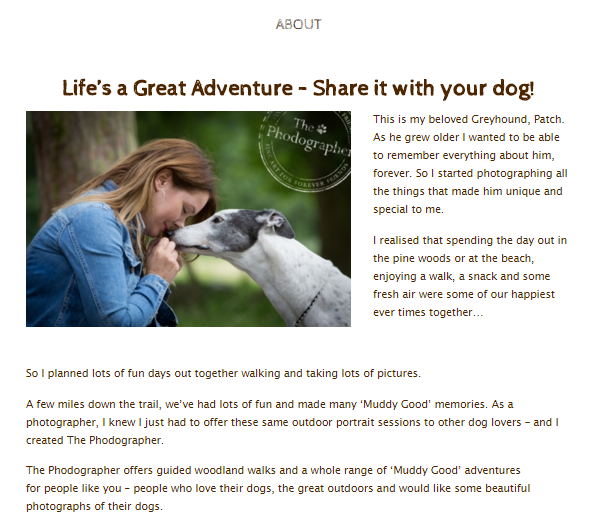Once finding who you want to be as a photographer the next steps after collecting photographs is presenting your work. Every photographer should have a website and an 'about' page. This post is going to explore the about pages of my favorite photographers as well as some new dog photographers I have not looked at before.
The first photographer I will be looking at is Tim Flach. I have admired his work for many years and so this will be very interesting for me to comment on how his BIO is presented.
The first thing I noticed was the amount of text that has been written, which is a good amount. The first paragraph is informative, it tells the reader what Tim Flach photographs, what he is interesting in as a subject matter and what his intentions are. The second paragraph talks about the work he has done including the names of the books he has made. A good way to promote his books. The last paragraph promotes him as a professional photographer by flaunting his participation withing the Royal Photographic Society and an award from Norwich University. Followed by where he lives and works including his family.
In my opinion I think his 'about' page would be better if it only had the first paragraph. I understand how it would be important to include the work he has done, as well as rewards for potential clients. However, there are more pages on the website that again repeats the projects he has done and the books he has made.
At the bottom of the about page is a link to 'View Wikipedia Page' which I think is unprofessional. It makes me feel like the author could not be bothered, as though it has all been written before. Because of this I still believe the second and third paragraph should have been deleted.
I have recently discussed The Phodographer in another post because her work has become a new inspiration to me. I like the way she has written this herself and it is not in third person like Tim Flach's about page. Her information flows well by telling it like a story. She starts by telling the reader how she began photographing dogs to what she offers. I do think the start of the page could have been condensed down.

Nick Ridley is a dog photographer I have not looked at before which mixes this blog post up a bit. The first thing to point out is the text at the top of the page that tells the reader he has been a dog photographer for over 30 years, something a reader is not really bothered about and could have said 'Nick Ridley is an experienced dog photographer..'. 'During 2015 he took over 45,000 dog related images' again some more useless information. Reading on I began to get bored, it goes on and on about what he has done. I think it would have been better if he had told the reader what he does and what he will offer you as a client.








